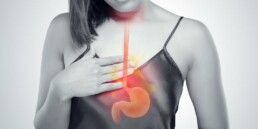DYSPEPSIA
Dyspepsia is defined as recurrent or chronic pain or discomfort in the upper abdomen (area between the bellybutton and shoulders). In addition to pain, individuals with dyspepsia may experience bloating, nausea, vomiting, eructation (commonly known as belching or burping), or may feel full after eating a small amount of food.
Symptoms of dyspepsia are usually intermittent, meaning they can worsen over several weeks, only to decrease or disappear entirely for some time.
CAUSES AND TRIGGERS
Dyspepsia may be caused by several factors, including:
- Excessive acid secretion
- Reflux esophagitis (inflammation of the tube that connects the mouth to the stomach)
- Food intolerances (e.g. lactose)
- Side effects caused by medication or natural health products
- Bacterial infection (e.g. Helicobacter pylori)
- Gastrointestinal ulcer
Symptoms may also be the result of psychological or social factors (e.g. anxiety, depression), or slowing of digestion due to motor or nerve problems. Sometimes, the exact cause of dyspepsia is unknown.
TREATMENT
Treatment depends on the cause. Making certain dietary and lifestyle changes may help alleviate symptoms. These include:
- Avoiding fatty foods (e.g. fried foods)
- Eating small meals more often throughout the day (five to six times a day)
- Avoiding foods that worsen symptoms
- Caution: do not stop eating whole food groups without first speaking to a healthcare professional
- Avoiding alcohol
- Avoiding caffeine (coffee, tea, cola, chocolate)
It may also be in your best interest not to lie down right after a meal, to quit smoking, to reduce your stress, and to achieve a healthy weight.
Certain over-the-counter medications, such as antacids (e.g. Tums, Gaviscon) or medications that decrease stomach acid production (e.g. Pepcid, Nexium), may relieve your symptoms. It is advised, however, that you speak to your pharmacist before taking these products. Other medications used to treat dyspepsia are available by prescription.
WHEN SHOULD I SEE A HEALTHCARE PROFESSIONAL?
- If you think your medication may be the source of your dyspepsia
- If you suffer from persistent nausea or vomiting
- If you vomit or spit up blood or if you have blood in your stools
- If you have difficulty swallowing or if swallowing is painful
- If you experience unexplained weight loss or loss of appetite
- If your symptoms worsen or do not improve after 2 weeks of treatment
- If you have chest pain
- If you have laryngitis, a chronic cough or hoarseness
- If you are asthmatic and your asthma is not well controlled
FOR MORE INFORMATION:
Canadian Society of Intestinal Research
GASTROESOPHAGEAL REFLUX
Gastroesophageal reflux disease (GERD), more commonly known as acid reflux, includes heartburn and the backflow of stomach acid into the esophagus (the tube that connects the mouth to the stomach).
Symptoms of acid reflux may include stomach pain, nausea, difficulty swallowing or pain when swallowing.
Other possible manifestations of GERD include:
- Cough or chest pain
- Sore throat or hoarseness
- Shortness of breath or wheezing
CAUSES AND TRIGGERS
The causes of GERD vary, and may be associated with the following:
- A problem with the lower esophageal sphincter, which prevents stomach contents from
backing up into the esophagus - A problem with the passage of food in the esophagus
- Slowed digestion
- Excessive production of stomach acid
- Bile reflux
Symptoms may be made worse by bending forward, lying down, smoking, and eating fatty foods or foods that are irritating (e.g., chocolate, coffee, alcohol). Obesity, age, pregnancy, and the use of certain medications can also contribute to symptoms.
TREATMENT
Making certain lifestyle changes can help alleviate acid reflux.
Here are a few measures you can take to prevent new reflux episodes:
- Eat small meals more often throughout the day (five to six times a day)
- Avoid foods that worsen symptoms such as mint and fatty foods
- Caution: do not stop eating whole food groups without first speaking to a medical professional
- Avoid alcohol and soft drinks
- Avoid caffeine (coffee, tea, cola, chocolate)
- Avoid exercising or bending forward after eating
- Avoid tight-fitting clothing
- Raise the head of the bed by about 10 cm
It may also be in your best interest not to lie down right after a meal, to quit smoking, to reduce your stress, and to achieve a healthy weight.
Certain over-the-counter medications, such as antacids (e.g., Tums, Gaviscon) or medications that decrease stomach acid production (e.g. Pepcid, Nexium), may relieve your symptoms. It is advised, however, that you speak to your pharmacist before taking these products. Other medications used to treat GERD are available by prescription.
WHEN SHOULD I SEE A MEDICAL PROFESSIONAL?
- If you think your medication may be the source of your GERD
- If you suffer from persistent nausea or vomiting
- If you vomit or spit up blood or if you have blood in your stools
- If you have difficulty swallowing or if swallowing is painful
- If you experience unexplained weight loss or loss of appetite
- If your symptoms worsen or do not improve after 2 weeks of treatment
- If you have chest pain
- If you have laryngitis, a chronic cough or hoarseness
- If you are asthmatic and your asthma is not well controlled
FOR MORE INFORMATION:
Canadian Society of Intestinal Research
Free delivery on prescriptions and medical supplies.
We offer free local delivery, curbside pick-up, and Canada wide shipping.

